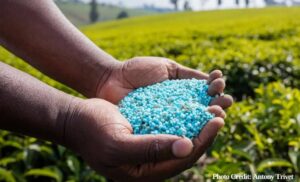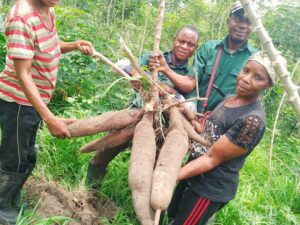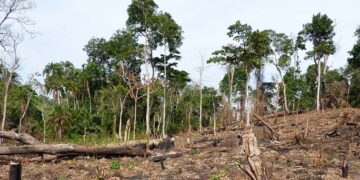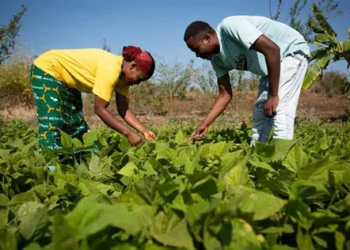OPINION
In times of polycrisis where many problems are happening at the same time, the country needs to pay attention to the sectors that contribute more to its GDP. Agriculture being the backbone of Uganda’s economy continues to rely on the use of agrochemicals a situation that has resulted in the production of unhealthy foods of which some are banned from international markets.

Due to over dependency on agrochemicals to produce food, over 1.3 million people in Uganda are getting affected annually by eating unsafe food and 10% of the population falls sick after eating the contaminated food. It should also be noted that our neighboring countries including Kenya have not once or twice banned our maize from entering their market due to aflatoxins and in 2019, the European Union threatened to impose a new ban on Uganda’s agriculture exports to Europe due to severe chemicals contamination on horticultural produce.
Further, in 2023, the Media reported that banned chemicals from other countries are cleared to enter the country, a situation that has posed the agricultural sector at risk due to over dependency on agrochemicals. Farmers continue to heavily rely on agrochemicals with no/limited information on the application of these chemicals. This has exposed farmers to health risks since some don’t have protective gear to use during the application of these agrochemicals.
According to a 2020 World Health Organisation report, about 385 million cases of unintentional pesticide poisoning, including 11,000 deaths, mostly in low- and middle-income countries such as Uganda, are registered annually worldwide. According to UNICEF, pregnant and breastfeeding mothers, children under the age of five, and the elderly are the most vulnerable to the effects of pesticides.
But the question is how did we reach here? This month I took the initiative to discuss with some small-scale farmers from oil-affected communities in Uganda under the agroecology campaign being run by the Center for Environmental Research and Agricultural Innovations where they are raising awareness about environmental agriculture practices. Farmers informed me about the limited agriculture extension services they receive from the district and some have never seen extension workers nor know where to find them.
This raises serious concern for the country’s biggest sector which employs over 70% of the total population. Famers said that farming has become so expensive whereby the fertilizers are expensive, some complained of the poor seeds that don’t germinate and some said that they got healthy issues due to the use of agrochemicals due to improper handling. Mr. Gideon who is a horticulture farmer from Kijumba village and the same time one of the many affected by the oil refinery and EACOP project said that, his production depends on chemicals and he has limited knowledge on environmental agriculture practices including the production of organic manures, pesticides, and soil biochar among others. Gideon represents the many farmers who depend on chemicals for production.
But why do farmers keep using these chemicals yet there are other cheap options like organic farming? From my interaction with small-scale farmers in the oil region, they lack knowledge on environmental agriculture practices and limited knowledge on the use of agrochemicals. The farmers continue with no option other than using what they find in the markets and there are many unlicensed agricultural seed and Chemical suppliers in the market. This has increased the supply of fake seeds in the market and fake chemicals being sold to farmers with fake descriptions. Famers have made losses due to the wrong pesticide applied and in 2022 farmers in the Rubirizi district were seen complaining about the chemicals that have contaminated their water sources, a situation that affected their bee-keeping business.

The continuous use of Glyphosate-based herbicides, in particular, has raised significant alarm due to their potential environmental and health risks. Globally, they have been linked to contamination of water sources, soil degradation, and potential carcinogenic effects on humans. However, farmers keep on using these chemicals a situation that resulted in some of our food products being denied access to international markets.
It should be noted that most of the farmers in Uganda are mainly subsistence farmers and that means if they all carry out production with poor farming methods, the country may face food insecurity soon. Further, some of the engaged farmers were displaced from their original land to pave the way for oil activities, this means alot of agriculture extension services are needed to train them on how to use the small plots of land to maximize production.
With this increasing climate change, the government needs to come out with comprehensive training and scale down these environmental agricultural practices including agroecology, organic farming, and agroforestry, among others to reduce farmers’ dependency on the use of agrochemicals to produce healthy foods that can be accepted in the international markets. The sector remains the main source of food, raw materials for industries, and employment of about 70% of Ugandans and contributes about 24% to the country’s GDP. This means that the government should pay attention to the issue of chemical use in production if we are to keep our foods in the international market.
Further, all agrochemical suppliers without licenses should be closed and regular monitoring done to stop the fake chemicals in the Market. The training on Environmental agriculture practices will put Uganda in a good position to produce healthy foods that will attract quick market both locally and internationally.
Remember we may need a doctor once in a while, a lawyer once in a while but we need food every day! That’s why farmer’s cries should be given attention and resolved to keep our country’s food secure and produce healthy foods free from chemicals. This will increase Uganda’s agricultural exports to international markets and increase the country’s revenue for social and economic development.
By Gerald Barekye,
The writer is the Executive Director at Center for Environmental Research and Agricultural Innovations (CERAI)
E-mail: geraldbarekye@gmail.com








































